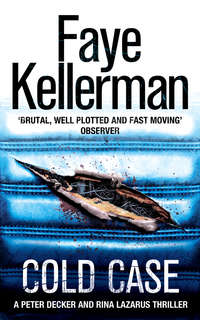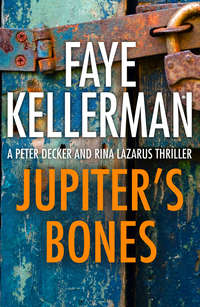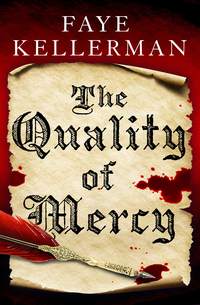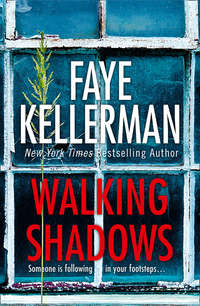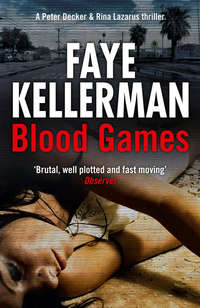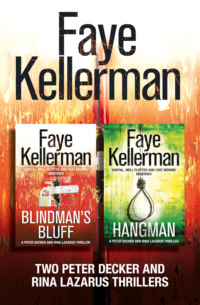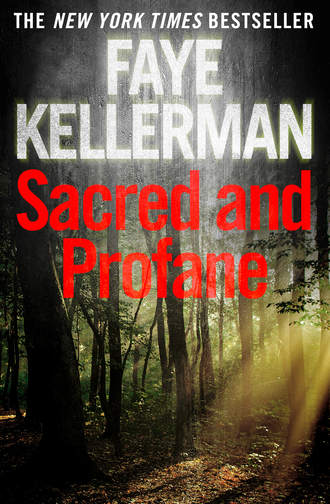
Полная версия
Sacred and Profane
“What’s that?” Decker asked.
“Uh, you know, the guy who writes the Torah and the mezuzahs,” explained Sammy.
“A scribe,” Decker said.
“Yeah, I think that’s what they call them,” said Sammy. “My other uncles, the ones married to my abba’s sisters, used to teach in yeshiva, but now they’re businessmen. They live in New York.”
“We’ve got tons of family there,” Jake said, excitedly. “We’ve got a bubbe and zayde and two great-grandmothers, and a whole bunch of cousins. We’re not alone at all.”
Then the little boy licked his lips and frowned. “But sometimes it feels like it.”
“Especially when you see scary stuff like today?” said Decker.
“Aw, that doesn’t bother me,” Jake said mustering up bravado. “That was kinda neat … kind of.”
“Eema’s other brother, the one that’s not a rabbi, sees dead bodies all the time,” Sammy said. “He’s a pathologist and owns cemeteries … Anyway, him and Eema get into fights about that all the time because he’s a kohain—a Jewish priest—and kohains aren’t supposed to to be around corpses.”
“Your uncle’s not religious?” Decker asked.
Sammy nodded. “Him and Eema fight about that, too. You can bet that we don’t see much of Uncle Robert.”
They rode another mile in silence. Decker broke it.
“Are you interested in medicine, Sammy?” he asked.
“No way,” Sammy answered. “I don’t like blood.”
“How about business? Like your New York uncles?”
“Borrrrring,” said Sammy.
Decker smiled.
“Well, you boys have plenty of time to figure out what you want to be. Heck, it’s okay to do a lot of different things in a lifetime. I used to do ranching when I was a kid in Florida. I did construction work in high school. I was a lawyer for a while, and I don’t see myself as being a cop forever. You’ve got loads of time to experiment.”
Sammy mulled that over for a while.
“You know what I’d like to be?” he said. “I think I’d like to be a journalist. Maybe write editorials that make people think.”
The kid was all of eight and a half.
The grounds of Yeshivas Ohavei Torah were located on twenty acres of brush and woodland in the pocket community of Deep Canyon. It was twenty freeway minutes from the police station and fifteen minutes from Decker’s ranch. The locals of Deep Canyon were working-class whites, and they and the Jews had little to do with each other, but over the past few years there had grown an uneasy, mutual tolerance.
The locals weren’t the only ones who felt uncomfortable with the Jewish community. The Foothill cops were equally baffled by the enclave, imagining it a slice of old Eastern Europe that had been frozen in a time warp. Actually, the yeshiva embodied aspects of both past and present, but the cops never delved that deeply. They had nicknamed the place Jewtown, which is what Decker had called it before his own personal involvement. Now, at least when Decker was around, they referred to it by its rightful name.
The lot for the yeshiva had been cut out of the mountainside. Huge boulders had been hauled away and the ground had been leveled, leaving a mesa of flat land surrounded by thick foliage, evergreens, and hillside. Set in the middle of a broad carpet of lawn was the main building—a two-story cement cube that contained most of the classrooms. On one side were smaller buildings—additional classrooms, the library, the synagogue, and the ritual bathhouse. The other side was open space for a thousand feet, then housing—a dormitory and a cluster of prefab bungalows.
Most of the yeshiva residents were college-age boys engaged in religious studies, but the place also had a high school, with secular and Jewish curricula, and an elementary school for children of the kollel students—married men studying Talmud full time. Private homes were provided for the kollel families, the two dozen rabbis who served as full-time teachers, and the headmaster—the Rosh Yeshiva. He was a meticulously dressed, distinguished man in his seventies named Rav Aaron Schulman. Rina’s husband had been his protégé and most brilliant student. Because of that, she and her sons had been allowed to stay on after he died.
Rina had once admitted to Decker that she was an outsider at the yeshiva. The women who lived on the grounds simply came along with their husbands or fathers. The school catered exclusively to men, and as a widow, she had no role there whatsoever. Though the residents treated her kindly—it was demanded of them by the Torah—she still felt like an interloper living in free housing, even though she taught math at the high school and operated the ritual bath. She knew she’d have to leave one day, but in the meantime she was grateful for the interlude that let her try to figure out what to do with the rest of her life.
Decker parked in front of the main gate, told Ginger to stay, and walked with the boys across the lawn. The place was almost empty at this time of the year; most of the boys had gone home to their families. Still, a seminar was being held on the grass. A full-bearded rabbi wearing a black suit and hat sat with five pupils—bochrim—under an elm. The students and their teacher were engaged in animated dialogue. Decker and the kids walked down the main pathway, turned onto a dirt sidewalk that cut through the residential portion, and stopped in front of a white bungalow.
“I’d appreciate it if you boys didn’t mention the bones until after I’ve spoken with your mother.”
They nodded.
Rina opened the door at Decker’s knock, her eyes widening with surprise, lips opening in a full smile.
“I didn’t expect you guys back until tomorrow!”
Sammy fell into his mother’s arms and embraced her tightly. He leaned his head against her breast and hid his gaze from hers. Rina cupped his face in her palms and looked at him, noticing moisture in his eyes and the tremble of his lower lip. She kissed him on his forehead and he broke away. Jake gave her a playful hug and smothered her face with kisses.
“I think they missed you,” Decker said.
“Happy to be home?” she asked them as they went inside.
The boys nodded.
“I’ve got surprises for you both. They’re on your beds.”
“Oh boy!” Jake exclaimed, heading for the bedroom. Sammy lagged behind.
“Shmuel,” she said, holding his arm, “is everything okay?”
He nodded.
“Something’s bothering you.”
“I’m fine, Eema. I’m just tired.”
“Okay,” said Rina, disconcerted at his evasion.
He gave his mother another hug, then trudged off to the bedroom.
“What happened?” she asked Peter as soon as they were alone.
“Could I have a cup of coffee, Rina?”
“Uh … Uh. Of course,” she said. “Sit down, Peter. You look exhausted.”
He took a seat on the left side of her brown sofa, letting his head flop back against the cushion, then ran his hands over his face.
“Why are the boys upset?” she asked.
“It’s complicated. But everyone’s fine.”
“Okay,” she said. “Relax. I’ll make coffee and then you can tell me what’s going on.”
Her house was tiny—800 square feet crammed with mementos—tchatchkas, she called them. Display cases full of Jewish figurines, propped photos, and sketches of Israel. The white walls were dotted with landscapes of the Judean dessert, charcoals of the Old City of Jerusalem and the Wailing Wall, and photos of the Lower East Side of New York. Hanging above the sofa was a magnificently colored and elaborately scrolled Hebrew document—her wedding contract, her ketubah.
That’s what a Jewish marriage is, she had said. A contract. You’re supposed to know what you’re getting yourself into.
But do you ever really know, he had wondered out loud.
Emotionally, of course not. But a ketubah spells out the specific obligations for a husband as well as a wife. You’ve got to remember that back then, most societies considered women things—objects. The idea that a man was accountable to his wife was revolutionary.
Her entire east wall was the family gallery—snapshots of her parents, and her brothers and their families, pictures of her sons as infants and toddlers clumsy in bulky diapers, and antique sepia portraits of her grandparents and great-grandparents in gilt frames. And the wedding pictures—Rina and Yitzchak under a canopy holding a shared wine glass. The groom was looking directly at the rabbi, his eyes intense and serious. He’d been a handsome young man, Decker thought, lean, with even, strong features. But Rina was the focus of the photograph—a stunningly beautiful girl with sapphire eyes and gleaming ebony hair that fell to her waist. She was dazzling as a bride. Whenever he looked at the picture, he felt a twinge in his chest.
His eyes drifted from the photo to the overflowing bookcases. She owned some secular books, but most were religious—Hebrew and Aramaic books of prayer, law, and ethics that were double and triple stacked on the shelves. She had skimmed through some of them, she had told him, but Yitzchak had known them all by heart.
Rina came back with black coffee for him and a milk-laced cup for herself. She sat down, tucked her legs under her denim skirt, and brushed midnight silk out of her eyes.
“Now,” she said. “What happened?”
“Everything’s okay,” he started out. “Sammy went exploring in the woods and came across a couple of human skeletons—”
“What?”
“It scared him, of course. It scared Jake, also, but they’re okay,” he said.
“What’d they do?”
“They asked a lot of good questions and I answered them. Kids do well with the honest approach.”
“Was it disgusting?”
“It was graphic.”
“What’d they ask you, Peter?”
“They acted pretty characteristically. Jake seemed more interested in the bones per se. How did they get there? Did the bad man who dumped them still live in the city? Is he going to kill us—”
“Dear God, I’d better talk to him—”
Decker held up the palm of his hand and continued.
“He watched the police procedures, and it was good for him. Gave him a sense of resolution. He’s not the one who took it to heart.”
“What’d Sammy say?”
“Sammy had a more adult concept about the whole thing. He talked about death—how the rabbis approached it. I think it was a speech he’d heard in the past. It may have brought back some painful memories.”
“Did he mention Yitzchak?”
“Not by name. He did tell me that Jews aren’t buried in airtight coffins—that their bones disintegrate into dust. Reading between the lines, you could tell what he was thinking.”
The room was silent for a moment.
“I’ll see how they’re doing,” she said quietly.
Decker nodded. She left the room and he slowly sipped his coffee.
It had been six months since he’d first stepped onto the grounds of the yeshiva, entering an alien world governed by laws codified thirteen hundred years ago. He’d been the detective assigned to a brutal rape that had occured outside the mikvah—the ritual bathhouse—and Rina had been a witness. As the investigation unfolded, it became clear that she’d been the intended victim all along. By the time the perpetrator was caught, their lives had become permanently enmeshed.
And now was the endless period of waiting. Long hours of studying that he hoped would lead to commitment. But often he wondered if this was what he really wanted. If Rina had never entered his life, he wouldn’t have changed. But she had, and he felt as if he were trapped between floors in a stuck elevator. His past seemed remote, his future uncertain. Some people found uncertainty exciting. He considered it a giant headache.
He closed his eyes, attempting to rest, and opened them only when he heard Rina reenter the room.
“They seem all right,” she said. “Jakey recounted everything in gory detail. He said the bodies had been burned.”
She looked at him for confirmation and he nodded.
“That’s repulsive,” she said shuddering. “He also said you were assigned to the case.”
“It’s called being in the wrong place at the wrong time.”
“Can’t get away from work, huh?”
“Ain’t that the truth,” said Decker. “How’s Sammy doing?”
“Quiet. He’s reading a book that Yitzy used to read to him. He hadn’t looked at it in years, and now it’s way too easy for him. You were right about reading between the lines.”
“He talked a lot about his father before he found the skeletons.”
Rina was taken aback.
“He did?”
“Yes. The kid has a good memory. He told me how Yitzchak used to take him to class and he’d sit on all the rabbis’ laps, about how he and his father learned together.”
Her eyes misted. “What else did he say?”
“He became very emotional when he described Yitzchak’s possessions—”
“What possessions?”
It had never dawned on Decker that Sammy hadn’t told his mother all of this. Suddenly, he realized that he was breaking confidences.
“Uh,” he stalled. “He has his father’s siddur, his tallis, things like that.”
Tears streamed down her cheek. She walked over to the window and stared outward.
“The day before Yitzchak’s burial,” she whispered, “I turned this house inside out looking for that tallis. I wanted him to be buried in it.” She shook her head. “And all this time, Sammy had it … I’m glad he does. In retrospect, it would have been stupid to bury a treasure like that. Yitzy must have known.”
Decker walked up behind her and put his hands on her shoulders. She turned to face him.
“Sammy doesn’t talk to me about his father. Not that I haven’t tried, but he refuses to open up. Maybe I get too emotional myself. But I’m glad he talked to you.” She laughed tearfully. “You’re a good guy, Peter. I’m sure you explained the corpses a lot better than I could have.”
“I don’t think that’s true,” he said. “Let’s just say I’m used to talking about things like that.”
She gave his hand a gentle squeeze, then pulled away.
“I was talking to Rav Schulman yesterday,” she said.
“How’s he doing?”
“Fine. He’s impressed with you. He’s says you’re very sharp, that you possess a natural Talmudic mind.”
Decker smiled.
“That’s good to know because I sure feel like a slug sometimes, especially with the language.”
“It will come, sweetie.”
“Maybe. I’m too old for this, Rina.”
“Nonsense,” she said. “Rabbi Akiva was forty when he started learning Torah. You’ve got a good year’s jump on him.”
“And look where it got him.”
“What do you mean?”
“Wasn’t he one of the ten rabbis who was tortured by the Romans? The one who had his back raked open by hot iron combs?”
Rina looked at him.
“All I meant to say was that coming to religion later in life isn’t necessarily a handicap,” she said. “Rabbi Akiva went on to be one of the greatest sages of all time, and he was a total ignoramus when he started learning. I certainly wasn’t thinking about how he died.”
Decker took her hand and kissed it. “I know you meant it as encouragement,” he said. “It was a morbid association.”
“I guess it was in line with your day,” she sympathized.
“Yeah,” he said. “It goes with the territory. Cops just seem to fixate on death.”
3
The dental offices of Hennon and MacGrady were on Roxbury Drive, north of Wilshire, in Beverly Hills. Decker pulled his unmarked ’79 Plymouth into a loading zone—the only free space he could find—and placed his police identification card on the front dash. It was late in the afternoon, almost dusk, and he was tired from battling city traffic. If the meeting with the forensic odontologist wasn’t unduly long, he’d make it home before eight.
He entered the waiting room, and immediately his nostrils were assaulted by pungent, antiseptic smells that plunged him into Pavlovian anxiety. The office decor did little to comfort him. The furniture was black and gray, the table, glass and chrome, and the eggshell walls were covered by monochrome graphic art—repetitive figure-ground designs, like a black-and-white TV test pattern. It made him dizzy and hostile.
A hell of an unfriendly way to furnish a dental office.
He walked up to a glass window and knocked on the frosted pane. The window slid open, and the receptionist, a blonde girl no more than eighteen, gave him a practiced smile.
“Can I help you?” she beeped.
“I have a five o’clock appointment with Dr. Hennon.”
“Name?”
“Decker,” he said.
She scanned the appointment book.
“Yes, you do,” she confirmed. “Is this your first time here, Mr. Decker?”
“I’m not a patient.”
The girl was thrown off balance.
“Oh,” she said, then brightened. “You’re the salesman from Dent-O-Mart, right?”
“No, I’m a police sergeant.”
She frowned. “Is anything wrong?”
“Why don’t you tell Dr. Hennon I’m here and you can call me when she’s ready to see me?”
She was still puzzled.
“She’s with a patient.”
“Just poke your head in, huh?”
The girl got up reluctantly and came back a moment later.
“She’ll see you in a minute, Sergeant,” she announced, relieved.
“Thank you.”
She slid back the partition and it slammed shut. End of conversation.
Decker sat down on an unyielding ebony cushion and squirmed uncomfortably. Sorting through the magazines on the table, he settled on Architectural Digest, skimming through pages of mansions he’d never be able to afford. He heard a door open, and glanced upward to see a woman at the reception desk. She had to be at least his age, he thought, maybe even a couple of years older, which would put her around forty-one or -two. Her face wasn’t anything to write home about, but her figure was tight—a good bust and a dynamite ass neatly packaged in designer jeans. She knocked loudly on the receptionist’s window, turned around, and flashed him a mouth full of ivories.
“Nice smile,” Decker said, returning her grin.
“It should be,” she said. “It cost me five g’s.”
“Well, you got your money’s worth.” He realized he was coming on to her inadvertently and returned his eyes to the magazine. But he could feel the heat of her gaze.
“What are you in here for?” she asked, pulling out a gold credit card.
“Business,” he said.
“Interested in a little pleasure?” she asked, lowering two inches of lash.
“I’m married,” Decker lied.
“So am I,” she responded. “I’m on number three and he’s unappreciative.” She puffed out her chest and gave him a full view. “He never notices my smile. And I do hate to drink alone.”
“I’m happily married,” he said.
“Yeah, aren’t all you guys with the roving eyes.” She signed the credit slip, threw the card into her purse, and snapped it shut. “Suit yourself,” she said, icily.
The receptionist slid open the glass panel.
“Dr. Hennon will see you now, Sergeant.”
“Thanks,” he said.
“Sergeant?” the toothy woman said. “You’re a military man?”
“Cop.”
“You don’t look like a cop.”
“No?”
“No. I would have said you were an architect or a producer.”
Decker looked down at his outdated suit and white shirt. His striped tie was loosened and his shoes were scuffed. Nothing about his appearance suggested money or sophistication.
“Then again,” the woman continued, “my second husband, Lionel, always said I was a good judge of lovers, but a lousy judge of character.”
Decker agreed with Lionel on both counts.
Dr. Hennon’s office was small but cheerful. Bright yellow walls full of posters with bold swatches of color. The room contained a cluttered desk, a corkboard full of notes and dental articles, and a Formica bridge table that held casts of teeth and jaws. Above the desk was a large, wall-mounted X-ray viewing box on which hung radiographs of teeth clipped to metal hangers.
To the left of the viewing box was a waist-up frame photograph of a man and a woman at sunset. A striking shot streaked with brilliant oranges and lavenders, the sun highlighting, almost bleaching out, the woman’s face. She appeared to be in her thirties, with milky green eyes, and a head full of metallic auburn waves. Her features were sharp and her face was long, ending in a strong, dimpled chin.
Decker took out a manila folder, opened it and began to scan for forensic reports on the two Jane Does. A moment later, the woman in the photo came in and offered him a delicate, manicured hand. He stood up and held out his own.
“Annie Hennon,” she said shaking his big, freckled hand.
“Pete Decker.”
“Thanks for coming down to my office, Pete.”
“No problem.”
“I appreciate it. Most cops don’t know that forensic odontology isn’t a full-time job. I look at skulls maybe a dozen times a year—unless there’s a disaster. We haven’t had too many of those lately, thank God. If I have to take a day off from the office to meet you at the morgue, I lose a great deal of income.”
“It’s a pleasure to be on the good side of town for a change,” he said. “That’s a nice picture of you.”
“Better than the real thing, huh?”
“I didn’t mean it that way.”
She laughed. “I’m just terrible. Thanks. It is a nice picture. That’s my brother and me. Mom took the picture. Mom’s an okay photographer.”
She pulled up a chair, and they both sat down.
“Actually, my brother is the one who got me interested in forensic odontology,” she said. “Him and Heinz.”
“Heinz?”
“Heinz Buchholz. A little white-haired gnome of a man who made his mark in history by identifying Hitler’s jaw. When I went to dental school, he was sixty-five, maybe seventy, and he used to roam the labs asking us students if his denture set-up would pass the state licensing examination. Can you imagine that? An important man like him decked with honors, a pioneer in forensic dentistry, and he was reduced to worrying about passing the state board.”
She shook her head and turned to Decker.
“You made quite an impression on Babs Terkel,” she said, dryly.
“Pardon?”
“My last patient. The bleached blond with the big boobs. She came back to my office girl and started pumping her about you.”
“I thought she had a nice smile.”
Hennon kissed her fingertips and spread them outward.
“My six-to-eleven porcelain fused to gold. Didn’t I do a great job?”
“I’ll say. She has a great set of teeth.”
“Now she does,” the dentist said emphatically. “You should have seen her when she walked through my door. Bucky Beaver.” She waved her hand in the air. “Babs is all right—narcissistic as hell, but she’s reliable. Keeps her appointments and pays her bills. I wish I had a thousand of those.”
She walked out of the room and came back carrying two cups of black coffee.
“You want some sugar? I’m all out of cream.”
“Black’s fine,” he said.
She noticed the forensic report.
“Been to the morgue, huh? The county one, that is, not the one out there.” She jerked her head toward the waiting room. “My partner’s wife and her decorator spent six months and ten thousand dollars redoing it to achieve the look of death. No accounting for taste. Anyway, what does the anthropologist say?”
“The report came in this morning. Doesn’t tell me too much, although I realize there’s not a hell of a lot to go on.”
“What did he come up with?” she asked, sipping her coffee.
“From the bone structure, he surmises that they were both female, young—in their late teens or early twenties at most—and Caucasian. Jane Doe One looked to be about five-four, five-five and small-boned. She had reached ninety-five percent of her postpuberty growth. Number Two was taller, maybe five eight, and had a large frame. She’d stopped growing according to the bone plates. The bodies weren’t lying in the mountains as long as I would have thought. From the skin fragments he said they probably were dumped about three months ago. They were burnt either alive or shortly after they were shot, because their fists had curled from muscle contraction due to the heat, which would only happen if there was still some muscle tone prior to rigor mortis. He also found a few partial fingerprints lodged in the inner folds of the finger joints, but that doesn’t help unless the girls had been printed. So far, I’ve struck out with that. There’s no record of their prints in our computer. They were shot with the same .38 caliber weapon—the bone rills match—and his guess is that the firearm was a Colt.”


